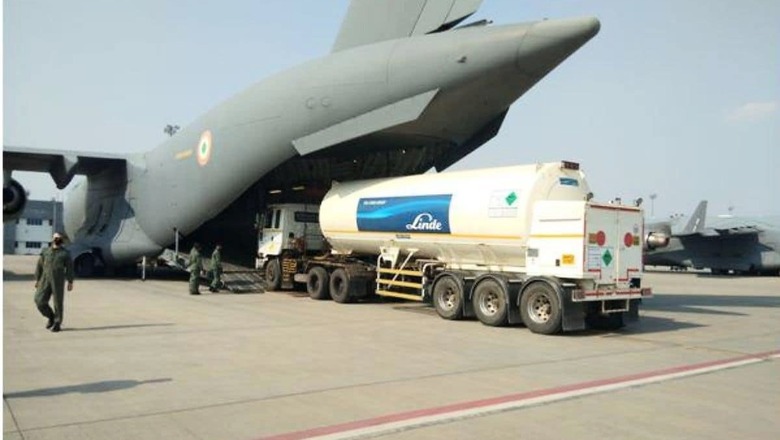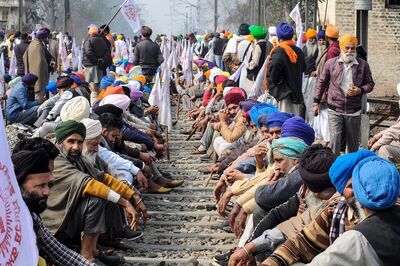
views
Over 1,500 sorties, 3,000 hours and 2 million kilometres. The distance covered is akin to going around the Earth 55 times.
These staggering figures are a testimony to how busy the Indian Air Force (IAF) has been over the past one-and-a-half months in its Covid-19 mitigation efforts.
Bolstering India’s fight against a devastating second wave of infections, IAF’s transport fleet has been making sorties round the clock, bringing in from abroad and distributing at home critical aid, including life-saving medical equipment and oxygen cylinders, thanks to its massive logistical muscles.
On Tuesday, News-18 visited New Delhi’s Palam air base, where one of the key Covid-19 management cells of IAF is located. The aid — from oxygen cylinders and containers to ventilator units and medical equipment — that comes from across the world and different parts of the country are first brought here, and then dispatched to their final destinations.
The task involves flying in and out on a short notice, and organisation of manpower and aircraft in mission mode with time being the most important aspect. Nonetheless, IAF has stood up to the task ever since it jumped into action in April. For example, a C-17 aircraft flew a gruelling 35 hours to ferry 37 tonnes of oxygen cylinders from the UK to Chennai.
“Whatever task has been assigned to us, it has been taken up in mission mode with the intent of optimising available resources so that aid can be distributed at places where it is required,” Air Vice Marshal M Ranade told News-18 at the air base. He is part of the team that is planning the movement of aircraft and aid.
“…for all the training that we get, we look for an opportunity to pay back (the country)…this (the mitigation mission) is an opportunity for us to put our training in good practice. Therefore, whoever is given a task, the thought in his mind is to contribute to national efforts so that citizens find succour in whatever way they can,” said Ranade, who has 35 years of experience in the force.
He added IAF personnel will not be satisfied till the last person in the country is free of Covid. “Till then, our efforts will continue.”
Ranade said IAF has brought in 120 oxygen containers from abroad, and over 685 tankers have been transported within the country.
“…all this (translates to) approximately 2 million kilometres. If that is to be put in perspective, it is as good as going around the Earth 55 times. Those are the kind of air miles that have been flown towards Covid mitigation.
“…the oxygen containers that have been transported …they would be adequate to provide oxygen to close to 29,000 oxygen patients for a month, or roughly 8.75 patients per 24-hour cycle. All this has been done by working round the clock, and maximising the efforts of airplanes and personnel who are required to fly,” he said.
Ranade stressed that IAF’s mission “to do the task in a professional manner” remains the same “whether it is war or Covid-10 mitigation”.
“The one big challenge that we have successfully overcome is ensuring the availability of platforms and personnel where it is required,” he said.
Ranade also said over “95% of our uniformed personnel are fully vaccinated”, stressing that this has helped the force in two ways.
The chances of contracting Covid-19 among IAF personnel is less, he said, adding even if there is a post-inoculation infection, the symptoms are mild. It has also provided a psychological boost to IAF personnel, who are “ready to go any place for any job without any mental turmoil”, Ranade said.
“We have been privileged to have received an opportunity from the government to get vaccinated as frontline workers.”
IAF has pressed in six types of aircraft, including AN-32s and the Super Hercules, for the onerous transport of critical aid. In all, 12 heavy-lift and 30 medium-lift aircraft have been earmarked for Covid-19 duty.
Wing Commander Sangram Singh flies a Super Hercules, ferrying life-saving equipment to places where they are required. He has flown “90 sorties in 30 days or so”.
“Time is of critical essence. Every cylinder we supply, every minute we save will save lives…,” he said, as aid was being loaded on to his plane at the Palam base.
The need of the hour is to save lives, and the air force is committed to that goal and helping the government towards that, he added.
“Super Hercules is a potent and versatile platform, apt for humanitarian aid and all-weather operations.
“There have been instances when we have flown round the clock on minimum notice. So there is no restricting that we fly only during daytime,” Singh said, underscoring the tireless efforts by IAF.
At one of the hangars, where aid is stored before being loaded on to aircraft, News-18 met Group captain APS Hooda and Squadron Leader Ramita, who are in charge of what IAF calls the Covid Air Support Management Cell.
Hooda explained that IAF had created “2-3 cells”; one of them is for “picking up” and distributing tankers and cylinders, including those coming by sea route.
Aid “contracted by the government of India” or donated by friendly foreign countries arrives at the Palam cell, either by “chartered flights or regular flights”, he said. With the involvement of the Indian Red Cross and the Hindustan Latex Limited (HLL) under the health ministry, this aid is then transported to different parts of the country — from Leh to Thiruvananthapuram and the west coast to the east and north-east — depending on “Covid caseload, the trajectory of recoveries” etc., Hooda said.
Aid going to nearby states such as Haryana, Rajasthan and Madhya Pradesh is generally moved via road, he said. He added every day about 20-25 sorties, involving smaller planes such as Dorniers to bigger aircraft such as Super Hercules, are undertaken. “…On average we handle 15-20 tonnes of load a day..,” Hooda said.
Ramita stressed the importance of team effort in the middle of the challenging Covid-19 situation.
“As pilots, we are always prepared to be sent wherever it is required. Right now, it’s a team effort the country is undertaking…the air force is undertaking (the efforts) with civil agencies so that we utilise the air efforts to maximum and send in medical aid wherever it is needed, as fast as possible,” she said.
Asked if there are concerns over Covid-19 infection while performing duties, she said: “It’s a good thing that we have been vaccinated…(Also) as pilots we get to fly to different places, but are not allowed to go outside even if we have family or friends in that city. We stay inside the air force station, which is a safe place.”
Read all the Latest News, Breaking News and Coronavirus News here. Follow us on Facebook, Twitter and Telegram.



















Comments
0 comment